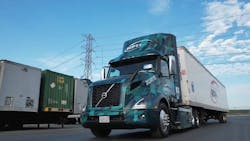There is so much happening in the trucking industry today that it can be hard to keep up and equally challenging to sort through all the options to determine which are best for your fleet.
The Advanced Clean Fleets regulation, upcoming greenhouse gas emissions standards, and other environmental regulations are focused on decarbonizing transportation. At the same time, all these regulations have challenges, and the upcoming presidential election adds another layer of uncertainty to the situation.
Regardless of what happens in the election and with challenges to regulatory initiatives, I think trucking will continue to move toward reducing harmful emissions—though the timeline may get extended.
It is important to remember that reducing emissions and decarbonizing is not just about battery electric vehicles. It can start with simple things like improving the miles you get from a gallon of diesel. There are many things fleets can do to stretch a gallon of diesel. This includes investing in aerodynamic devices on both the tractor and the trailer, switching to low rolling resistance tires, and adding idle reduction devices. But it also should include things like optimizing electronic engine parameters for fuel economy, governing speed, coaching/training—and rewarding—drivers for driving in a fuel-efficient manner and making sure all vehicles are well maintained.
See also: Trucking issues don’t take vacation
In addition, fleets operating older equipment should consider retiring those assets and purchasing newer model year diesel-powered trucks, which are much cleaner than older models and are coming off the production line with a sleeker, more aerodynamic design.
But I also think fleets need to begin looking at alternative-powered vehicles because those will have a place in trucking’s future. This includes exploring renewable fuels, BEVs, hydrogen fuel cells, hydrogen internal combustion engines, and hybrids. Options abound for fleets, and each of these powertrains is at different levels of development.
BEVs are getting the most media coverage and seem to be further along in their development than some of the other powertrain options, so that may be a good place to start. There are many options when it comes to BEVs; models are available from traditional truck makers but also from a host of new entrants.
The key with any new powertrain is to make sure you deploy them in applications that can perform well. At this point in their development, BEVs are not ready to take on long-haul duty cycles. Batteries don’t have enough range and there is no national charging network.
However, trucks that return to base daily in applications like local and regional haul are a good place to begin deploying BEVs. I am not suggesting that you totally switch your fleet from diesel to battery electric, but rather that you begin talking with BEV manufacturers and your local utilities to get a good understanding of what it will take to start adding BEVs to your operation.
As with any new technology, there are going to be issues with the performance of BEVs, but there also are likely to be significant improvements in the technology more quickly than what is typically seen with existing technology.
Regardless of what happens in the regulatory and political arenas, many companies have committed to sustainability. If you want to remain their transportation partner, you must do your part to help them meet their sustainability goals.
As I said, there is a lot going on in trucking, but sitting on the sidelines to wait and see what happens no longer seems like a good option for fleets wanting to remain profitable.
About the Author
Gino Fontana
Chief operating officer and executive vice president at Transervice Logistics Inc.
Gino Fontana, CTP, is COO and EVP at Transervice Logistics Inc. His operational expertise emphasizes cost savings, process efficiency and improvement, superior quality, and people management skills. He has more than 35 years of experience in the transportation and logistics industry with both operational and sales experience.
